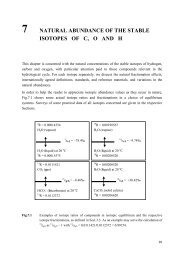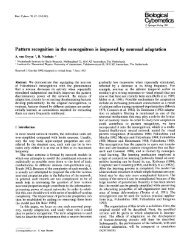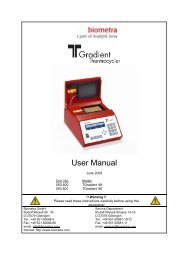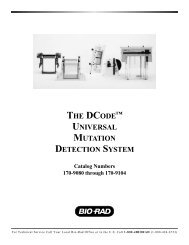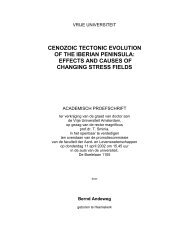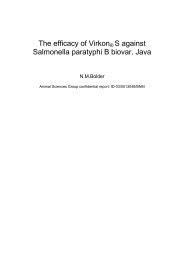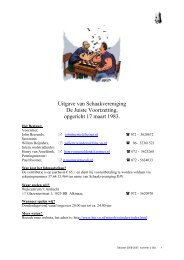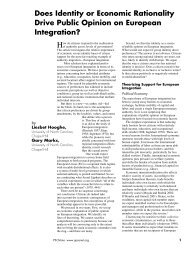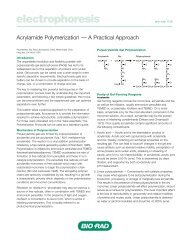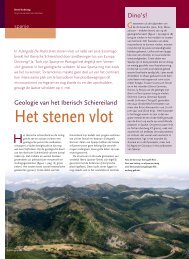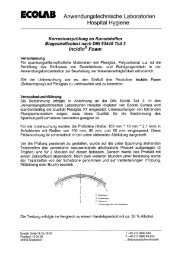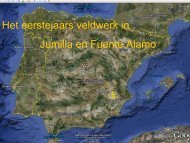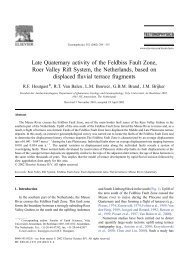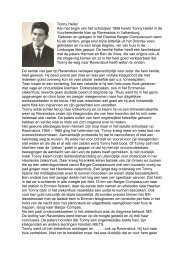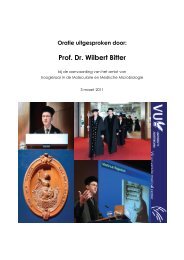Hydrogeochemical Transport Modeling Course - Falw.vu
Hydrogeochemical Transport Modeling Course - Falw.vu
Hydrogeochemical Transport Modeling Course - Falw.vu
You also want an ePaper? Increase the reach of your titles
YUMPU automatically turns print PDFs into web optimized ePapers that Google loves.
Phast<br />
Phreeqc<br />
Python Pest<br />
OVERVIEW<br />
This 4-day course introduces participants to the modelling of hydrochemical,<br />
isotope geochemical, and microbial processes with the popular PHREEQC and<br />
related software. Simulation of all major biogeochemical processes will be<br />
explained and practiced step-by-step starting from simple systems and going<br />
towards more complex integrated case studies in the end. The course is<br />
designed for people who want to refresh their knowledge on (isotope)<br />
hydrochemistry and learn how to construct (isotope) biogeochemical models for<br />
their own studies. The course focuses on applications in environmental<br />
chemistry and contaminant hydrogeology in groundwater and soils. Exercises<br />
cover both organic and inorganic (metal) biogeochemistry.<br />
<strong>Hydrogeochemical</strong><br />
<strong>Transport</strong><br />
<strong>Modeling</strong><br />
<strong>Course</strong><br />
Instructor: Dr. Boris M. van Breukelen<br />
Hosted by the Freie Universität Berlin, Germany, 27-30 March, 2012<br />
“Groundwater acidification: Nickel mobilization and Al cation-exchange”<br />
COURSE CONTENTS AND GOALS<br />
• Learn to make a conceptual hydrochemical model: which processes and<br />
model parameters are relevant, extent of complexity<br />
• How to program a conceptual model in a PHREEQC input file, extend the<br />
database file, and inspect the model outcome (PfW, Excel, Python)<br />
• How to simulate the main hydrogeochemical processes: complexation,<br />
mineral dissolution/precipitation, cation exchange, surface complexation,<br />
redox processes and biodegradation<br />
• When and how to formulate reactions as kinetic instead of equilibrium<br />
• How to simulate microbial growth following various approaches<br />
• How to simulate isotope fractionation processes in geochemical models<br />
• Which cases require batch, mixing, inverse, 1-D flow path, and 3-D flow<br />
models (with PHAST). All these model types will be applied<br />
• Model calibration, sensitivity, and uncertainty analysis with PEST
Two thirds of the course time is devoted to computer exercises, one third to<br />
lectures. Computer exercises will be introduced by short lectures and explained<br />
afterwards. Besides Phreeqc for Windows, other useful and freely available<br />
open source software will be instructed: PHAST (PHREEQC coupled to HST3D for<br />
3-D modelling), PEST (for Parameter Estimation), and Python (open source<br />
alternative to MATLAB for making graphs; see examples in this flyer).<br />
ENROLLMENT & REGISTRATION<br />
The fee for the 4-day course is € 1100. Each day 6½ hours of instruction will be<br />
given excluding three breaks of in total 2 hours. The number of participants is<br />
limited to 14. The fee covers instruction, desktop computers to work on, the<br />
course material printed and on USB flash drive, lunch and refreshments on all<br />
days, and a certificate of participation.<br />
COURSE INSTRUCTOR<br />
The course will be presented by the international expert Dr. Boris van<br />
Breukelen, Assistant Professor Hydrochemistry at the VU University Amsterdam<br />
and specialist for modelling of biogeochemical processes and associated isotope<br />
fractionation in (polluted) groundwater environments. This course will be given<br />
for the fifth time.<br />
“Microbial As(V) respiration: Microbial growth at thermodynamic limits”<br />
COURSE LOCATION, TRANSPORTATION, AND LODGING<br />
The course will be held at the Freie Universität Berlin, Institute for Geological<br />
Sciences, Workgroup Hydrogeology. Detailed information regarding<br />
transportation, parking, and lodging will be sent upon registration.<br />
“3-D PHREEQC modelling with PHAST: Aerobic benzene degradation”<br />
COURSE AUDIENCE<br />
The course is aimed at researchers, PhD-students, consultants, and engineers<br />
who (plan to) undertake hydrochemical modelling as part of their work or<br />
studies. The use of PHREEQC both as research instrument and practical tool will<br />
be shown.<br />
PREREQUISITES<br />
Participants will benefit the most from this course if they have a basic<br />
knowledge and understanding of groundwater (flow/transport) and<br />
hydrochemical processes. Prior modelling experience is not required.<br />
FURTHER INFORMATION & REGISTRATION<br />
Dr. Andreas Winkler<br />
Freie Universität Berlin<br />
Inst. f. Geologische Wissenschaften , AB Hydrogeologie<br />
Malteserstr. 74-100, Haus B; D 12249 Berlin, Germany<br />
e-mail: rnlab@zedat.fu-berlin.de; Phone: +49 30 838 70 614



